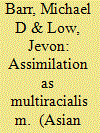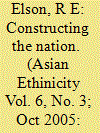| Srl | Item |
| 1 |
ID:
072651


|
|
|
|
|
| Publication |
2005.
|
| Summary/Abstract |
The myths of meritocracy and multiracialism 'explain' between them both the 'fairness' of the Singapore system and the subordinate role of the non-Chinese minority races. They also purport to assure the minorities that they enjoy full status as members of the nation-building project and that their cultural and religious mores are embraced and protected within its framework. Using the Malay minority as its case study, and arguing from archival, oral, official government and secondary sources, this paper argues that the Singapore systems of meritocracy and multiracialism have not been concerned primarily with intercommunal tolerance since the 1970s, but are now programmes of assimilation of the racial minorities into a Chinese-dominated society.
|
|
|
|
|
|
|
|
|
|
|
|
|
|
|
|
| 2 |
ID:
072650


|
|
|
|
|
| Publication |
2005.
|
| Summary/Abstract |
This article examines the ways in which some early twentieth-century Indonesian thinkers conceptualised the state they had so recently imagined, and particularly how they attacked the vast problem of accommodating ethnic difference within the framework of that new state. Notwithstanding the highly promising beginnings of Indonesian self-appreciation in the early twentieth century and an extraordinarily successful cooptation and, as necessary, subjugation of local and regional expressions of ethnicity to the notion of a united Indonesia, there developed at the same time the new and strange concept of an 'Indonesian race'. That concept represented a regressive reluctance to dispense completely with pre-modern notions of culture and belonging, and created a damaging feature of the understanding of Indonesian citizenship that endures to this day.
|
|
|
|
|
|
|
|
|
|
|
|
|
|
|
|
| 3 |
ID:
072654


|
|
|
|
|
| Publication |
2005.
|
| Summary/Abstract |
In this article, I explore the ways in which ethnic identity is expressed by following the formulaic socio-linguistic norm, the very method of which defies the authenticity of identity itself, thereby asserting the identity's multi-facetedness as sustained in performative linguistic practice. I look at multi-sited socio-linguistic interactions among Koreans in Japan, who claim their primary identity to be that of North Korea's overseas citizens even though none of them have North Korean passport or nationality. Their identity, in other words, is based on ideological commitment, which is in reality supported by their ongoing linguistic practice. A close look at their socio-linguistic life reveals their ethnicity's dual or multiple ontology, which challenges among other things the currently dominant assertion of Japanese self in the western academic discourse.
|
|
|
|
|
|
|
|
|
|
|
|
|
|
|
|
| 4 |
ID:
072652


|
|
|
|
|
| Publication |
2005.
|
| Summary/Abstract |
A diagnosis of the ethnic empowerment fuelled by the Chinese Manchu middle-class elite provides a useful tool for examining the overall Manchu identity revival movement in the 1980s. The strategy of the Manchu middle-class elite has three parts: re-crafting ethnic identity by strengthening networks and cultural differences, pursuing ethnic economic development, and politically legitimating the group existence. This article explores several important questions concerning the strategy. Why is the ethnic middle class keen to provide vigorous leadership in the ethnic identity reconstruction movement? How do the people of this class invest their bitter grievances with new meaning and empower themselves in the process of bargaining and group confrontation with the State? How can they make their ethnic identity more likely to be 'institutionalised' into the ethnic mosaic of the People's Republic of China (PRC) in the Open and Reform era?
|
|
|
|
|
|
|
|
|
|
|
|
|
|
|
|